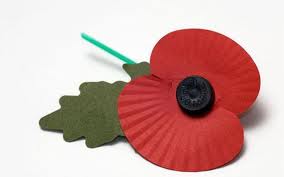By Andrew Warshaw
November 3 – England and Scotland look set to defy a FIFA ban on players wearing poppy symbols on their shirts when the teams meet for a World Cup qualifier on Armistice Day on November 11 after British Prime Minister Teresa May waded into the dispute.
FIFA rules forbid players from wearing anything that can be perceived as a political or religious statement but whether wearing poppies constitutes either of these is fiercely debatable.
England and Scotland could be sanctioned if they do not comply but will let their players wear black armbands with poppy emblems and are willing to accept any punishment for honouring the war dead of all conflicts since World War 1 when the tradition first began.
“The poppy is an important symbol of remembrance and we do not believe it represents a political, religious or commercial message, nor does it relate to any one historical event,” the English FA tweeted.
“In keeping with the position agreed with FIFA back in 2011 and in what we believe is in accordance with Law 4, para 4, the FA intends to pay appropriate tribute to those who have made the ultimate sacrifice by having the England team wear black armbands bearing poppies in our fixture on Armistice Day.”
The Scottish FA made a similar statement saying: “We intend to pay appropriate tribute by having the Scotland national team wear black armbands bearing poppies.”
Explaining why it was imposing the ban, which has made headline news throughout Britain, FIFA said it “fully respects the significance of commemorating Remembrance Day on 11 November each year” but sought to throw responsibility for the rule at the door of the four British associations themselves who, together with Fifa, comprise the game’s law-making body.
“The Laws of the Game are overseen by the International Football Association Board (IFAB) and applicable to all 211 member associations. The relevant law clearly states that the players equipment should not carry any political, religious or commercial messages,” FIFA stated.
On Wednesday May denounced the decision in no uncertain terms.
“I think the stance that’s been taken by FIFA is utterly outrageous,” she said in parliament. “I have to say to FIFA that before they start telling us what to do, they jolly well ought to sort their own house out.”
FIFA general secretary Fatma Samoura told the BBC that “any kind of sanction” could follow. “We have to apply uniformly and across the 211 member associations the laws of the game,” she said.
“Britain is not the only country that has been suffering from the result of war. The only question is why are we doing exceptions for just one country and not the rest of the world? It is not really my ambition to punish anybody. They just have to recognise themselves that they are part of the rules of the game and they should be ready to face any kind of sanctions or measures.”
But English FA chief executive Martin Glenn said players on both teams would wear black armbands carrying the poppy symbol “as a point of principle”.
“We are standing shoulder to shoulder with the other home nations on this, we all feel very strongly,” he said. “It’s not a political symbol and I think most people would agree with us. We don’t think we are breaking their law – we think FIFA are misinterpreting it. “
The Welsh FA has also written to FIFA requesting permission to wear poppies on armbands during their game against Serbia in Cardiff on 12 November.
A petition urging FIFA not to uphold the ban has attracted more than a quarter of a million signatories while football’s world governing body has been accused of double standards after it emerged Republic of Ireland players wore a political symbol on their shirts in a friendly against Switzerland on March 25 to mark the centenary of the Easter Rising, an Irish rebellion against British rule which lasted for five days in April 1916 and resulted in 485 deaths.
Co-incidentally, the IFAB is holding its annual business meeting in London today with various items up for discussion ahead of the main IFAB session next spring. Although not on the agenda, the poppies issue seems likely to be dominate proceedings with Scottish and English FA chiefs hoping to convince FIFA to change its mind.
Contact the writer of this story at moc.l1714257029labto1714257029ofdlr1714257029owedi1714257029sni@w1714257029ahsra1714257029w.wer1714257029dna1714257029

